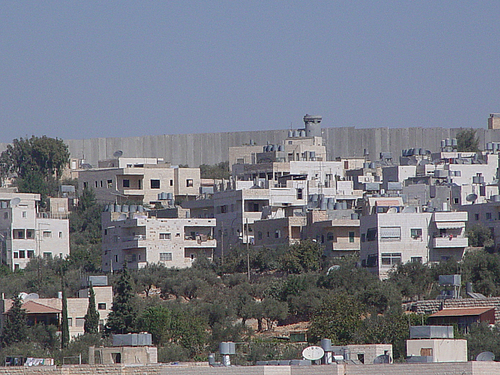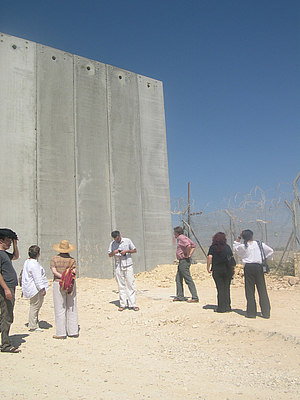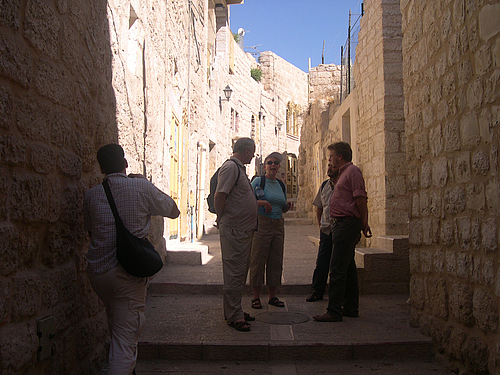Rethinking the Mediterranean
By Christiane Dabdoub Nasser
Looking back to the last few years or so, a substantial number of workshops and seminars on the topic of oral history, ethnicity and memory have been held, involving both Palestinian and international academics. The fact that we have caught up with the increasingly widespread interest that many anthropologists are giving to this particular area of human action and expression is indeed commendable. What is amiss, however, is the fact that the data remains largely locked behind the bars of academic scholarship and the debate remains limited to researchers and specialists in the field of human sciences when such research can feed most effectively in various areas of education and development, and more particularly tourism development, which potentially stands as a major contributor to the Palestinian economy.
The advantage that this field of research has mustered, a rather unorthodox one when compared to our mainstream approach to the human sciences and education – still very much traditional and rather confined to fixed precepts – is that it has most happily integrated a plethora of audio-visual and IT supports. Technology in the service of anthropological research has generally rendered fieldwork more reliable and durable and much more exciting, but it has also opened vistas of creativity in the applications of results. Mediterranean Voices: oral history and cultural practice in Mediterranean cities (Med-Voices) is one such project which marries serious research with IT applications and many of the outputs designed through Med-Voices rely on this support.
The Centre for Cultural Heritage Preservation in Bethlehem has strived to be part of such a research project, conceived and developed by London Metropolitan University (LMU) and funded by the European Union through its EuroMed Heritage II programme. Med-Voices, a partnership initiative between LMU and 13 research institutions in the Mediterranean basin, consists of a neighbourhood-based ethnographic investigation into the cosmopolitan oral and social histories of partner cities and provides unique access to an interactive multi-media and multi-lingual oral history database. For the Bethlehem partner, it is an attempt to capture some areas of human communication and performance that constitute what is elusively termed as Bethlehem voices and cultural practice, and try to interpret and give meaning to both.
On April 7, we will launch two major events for our project: an exhibition entitled Shared Spaces in time of crisis: memories of Alexandria, Ancona, Beirut, Bethlehem and Split, which was designed in coordination with our partners in Alexandria, Ancona/Split and Beirut, and our on-line database www.med-voices.org
The exhibition presents four different views of crisis situations as represented by our four partner cities. It also tries to bring home the important message that the movement of populations within Mediterranean shores / Mediterranean cities should occur within a cosmopolitan climate where borders are geographic demarcations rather than boundaries of conflict, hatred, discrimination, marginalisation and poverty. It aims to show how the recent memory of the Eastern Mediterranean, replete with conflict and the ills that conflicts bring on the populations, counters the pluralism that was normally associated with the ancient sea today. It attempts to understand issues of mobility, nostalgia, boundaries and shared spaces, and cultural pluralism and cosmopolitanism, and draw attention to the fact that living together implies a culture of tolerance and exchange where difference becomes an asset rather than a liability, and how sharing spaces is a process that is constantly challenged by considerations of ethnicity, mobility, communitarian allegiances, crises and conflicts. For Bethlehem in particular, it tries to show that nostalgia for lost time and space can be constructed through the understanding of present conditions, historical determinants and future aspirations.
The above themes are developed further in our website and many more emerge related to the categories chosen to represent the intangible heritage of the Mediterranean in the Med-Voices research. www.med-voices.org is the result of an ambitious collaboration among all partners and it presents to a wide public of researchers, specialists in the fields of tourism, education and heritage management as well as the lay browsers, Bethlehem and partner cities as seen through the eyes of a team of investigators and researchers. The website has been specially designed to allow simple or very complex searches of the database of media files, including video, audio, flash and PDF and it will continue to grow as more resources are up-loaded until the expiry date of the project in December 2005. As partners, we are already discussing possibilities of sustainability beyond that date.
In addition to the above outputs, the Centre produced a weekly radio programme Ájyal tatawasal, in partnership with Dar Annadwa, which was aired on Bethlehem 2000 Radio for six consecutive weeks, starting on November 30, 2004 until January 4, 2005. The initial idea behind this programme was to introduce Med-Voices to the public and try to engage a debate on the different aspects of cultural heritage, both tangible and intangible, and the dynamics heritage can and has generated within recent development planning. In a way, it was also a matter of tying the research with our Centre’s urban rehabilitation and conservation projects, which rely to a large extent on understanding the multi-faceted aspects of historic quarters and neighbourhoods, including a side-view on the social, cultural and economic factors that have shaped their development.
Our experience with the radio show made us realize to what extent awareness of heritage is weak, recognition of its scope and value in the life of the community lacking, and understanding of the issues related to its development almost non-existent. This is where a project such as Med-Voices can make a dent by creating new understandings of heritage as something beyond the monumental, and better knowledge of the processes and challenges that influence its interpretation and expression, where the ‘voices’ who create it and recreate it can become part of the decisions concerning its development.
The exhibition will be implemented in partnership with the Bethlehem Peace Center (7-16 April), Al Najah National University – Faculty of Fine Arts, Nablus (20-27 April), and Khalil Sakakini Cultural Center, Ramallah (2-13 May).
Christiane Dabdoub Nasser is the Head of Public Awareness and International Relations at the Centre for Cultural Heritage Preservation in Bethlehem.
Article Photos by: Centre for Cultural Heritage Preservation - Med-Voices Archive


